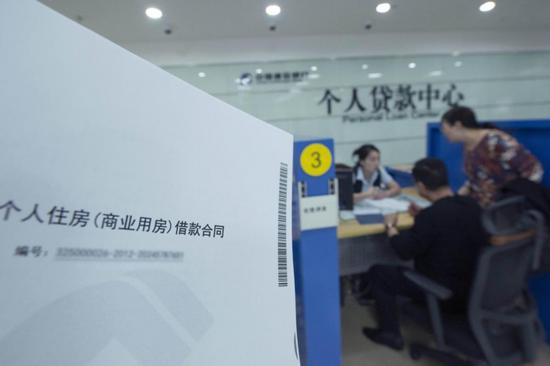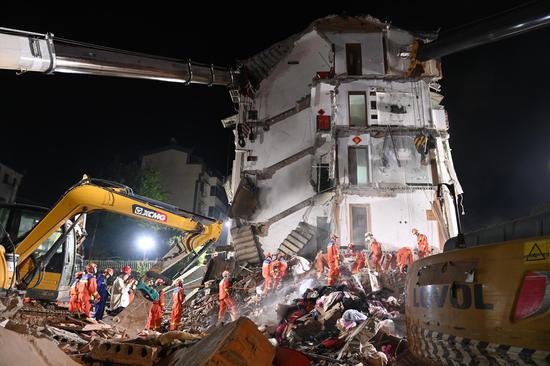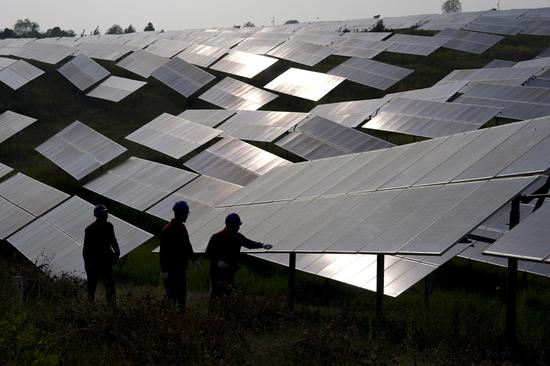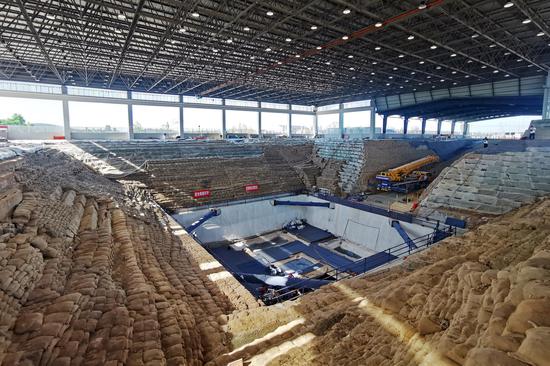
Clients inquire about home loan procedures at a bank in Haian, Jiangsu province. (XU JINGBAI/FOR CHINA DAILY)
Some Chinese cities responded to the national policies with an array of measures to shore up local property markets, which triggered speculation that more cities will likely follow suit.
Both of South China's Guangzhou and Shenzhen announced on May 28 they will loosen restrictions on home buying.
Shanghai removed more restrictions on homebuying on May 27 by allowing eligible single buyers to buy used homes in downtown. Families with more than one child can now buy an extra residential property.
A nine-item local notice that took effect in Shanghai on May 28 included adjustments to home purchase restrictions, support for reasonable home living requirements for families with more than one child, optimization of credit policies, encouragement for trade-in deals and improvements to land and housing supply.
Cities including Wuhan of Hubei province and Huzhou of Zhejiang province have reportedly lowered down payment ratios for first-home buyers to as low as 15 percent, said Yan Yuejin, director of the Shanghai-based E-house China Research and Development Institution.
Beijing, Shanghai, Shenzhen in Guangdong province and Hefei in Anhui province also announced other supportive measures, like cutting interest rates on mortgages and housing provident fund.
Some commercial banks in Central China's Wuhan went further by lowering the first-home loan interest rate to as low as 3.25 percent, said Yan.
The list gets longer by the day. Experts said many more cities are expected to cut various minimum requirements to buy homes.
In fact, some 50 cities had already eased their respective restrictions on homebuying ahead of the May 17 announcements. And 23 cities, including Xi'an of Shaanxi province, Hangzhou of Zhejiang province and Chengdu of Sichuan province, had scrapped all limits with regards to home transactions, according to statistics from the Zhuge Real Estate Data Research Center.
Brodie said due to the continued impact of market factors like house price expectations, the stabilization of the residential real estate market will likely still take some more time to reach a positive growth recovery point.
"These new policies focus on reducing the cost of purchasing property and the threshold for homeownership, which may boost confidence on the demand side. The government may need to take measures to flexibly adjust land supply and precisely control the pace of new housing development to prevent any further imbalance between supply and demand."
The property data released on May 17 indicated that adjustments in the industry are continuing, said Liu Aihua, spokeswoman of the National Bureau of Statistics.
"Both market resumption and confidence recovery require time, and uncertainties remain in the forthcoming market stabilization process," said Chen of CBRE.
On creating a new real estate development model and promoting high-quality real estate development, she suggested structural adjustments on the supply side and more diversified measures to boost demand.
Pang said it is also essential to note that merely using monetary policies such as lowering down payment ratios and mortgage rates cannot completely, effectively and fundamentally solve the cyclical, structural and trend-related challenges facing the real estate market.
"At present, the real estate market is still in the process of determining the lowest point, continuing to make necessary adjustments. Accordingly, real estate regulation should steer clear of too simplistic and linear policy approaches aiming to stimulate an overly frigid market or restrict overheating," Pang said.
He suggested regulators should develop a deeper understanding of the changes in supply and demand, recognize the role of city-specific policies and adjust measures to local conditions, and consider both incremental and stock issues comprehensively.
Chinese cities reported deeper home price drops in April both in year-on-year and month-on-month terms, which indicated the property market remains in a process of adjustment, said Wang Zhonghua, an NBS statistician.
Price declines accelerated month-on-month in all the third-tier cities in both markets (for new homes and pre-owned properties), said Wang.
He attributed the big price drops to the evident increase in the number of homes available for transacting in the pre-owned home market and a weak market expectation. "The property industry should continue to adapt to the changes taking place as efforts are made jointly to build a new property development model," said Pang.


















































 京公网安备 11010202009201号
京公网安备 11010202009201号